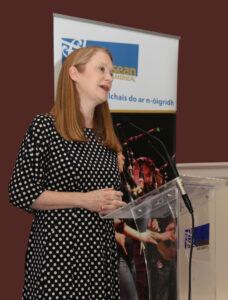Organisers and tutors involved in Fèisean across Scotland met in Stirling at the weekend for the annual conference of Fèisean nan Gàidheal, as a new report confirmed the Fèis movement, prior to the Covid pandemic, supported 116.5 full-time equivalent jobs (FTEs) across Scotland, generating an annual income of around £3 million from employment.
Fèisean facilitate the tuition of Gaelic arts skills in communities, supported by Fèisean nan Gàidheal, while the latter also organises a range of music and Gaelic language teaching in schools as well as running the annual Blas Festival and a range of activities to enrich the Gaelic language skills of young people.
Its annual conference is an opportunity for voluntary committees, staff and tutors to gather and take part in workshops and information sessions. The conference was addressed by Shirley-Anne Somerville MSP, Cabinet Secretary for Education and Skills, who also has responsibility for Gaelic.
The Cabinet Secretary said: “I would like to congratulate Fèisean nan Gàidheal on its commitment to working with young people in schools and in communities, in what has been a challenging couple of years for all. I commend Fèisean nan Gàidheal and its volunteers for their ability to adapt delivering their work online and creating opportunities to widen its reach and make Gaelic culture and arts accessible to the wider world and for those who wish to engage with the Gaelic language.”
The organisation’s Annual Report, published at the weekend, gives an account of the work supported during 2021-22 which reached over 103,000 people.
Fèisean nan Gàidheal’s Chief Executive, Arthur Cormack, said: “The last couple of years, while challenging, have also brought opportunities. Numbers involved in Fèisean reduced, due to their inability to operate as normal, but our work in schools thrived and we reached a healthy online audience for events. Gradually, Fèisean have been returning to normal activities this year and supporting voluntary committees to begin achieving pre-Covid levels of participation will continue to be Fèisean nan Gàidheal’s priority.”
Among the topics discussed at the conference was an independently authored report on the cultural, social, economic, linguistic and wellbeing impacts of the work of the Fèis Movement. Authored by Steve Westbrook and Sandy Anderson the study found that, individually and together, the Fèisean have developed into a significant force in the preservation, nurturing and development of traditional music and culture and the Gaelic language across Scotland and internationally; while impacting positively on the people and communities who deliver and take part in the Fèisean at the heart of the movement.
Anna Murray, Fèisean nan Gàidheal’s Chair added: “We were delighted to welcome Fèis organisers and guests to Stirling and we welcome the range of positive outcomes outlined in the new report which will be useful in the organisation’s advocacy work.”
“We are aware of the ongoing task to ensure Fèisean are supported to re-establish their tremendous work and I would like to extend my thanks to all the volunteers who continue to support local Fèisean. Along with artists, they are the Fèis movement’s most precious asset.”
“With the impending increase in energy costs we recognise the potential impact on the ability of parents to afford Fèis activities for their children. We take very seriously our commitment to provide access to cultural activities for as many young people as possible and will strive to ensure they, and their parents, are supported.”
Fèisean nan Gàidheal’s Annual Report is available, in Gaelic and English, at www.feisean.org.
